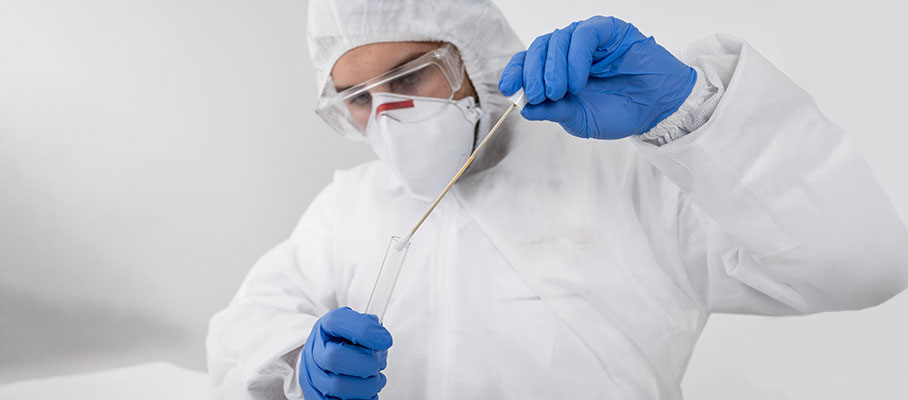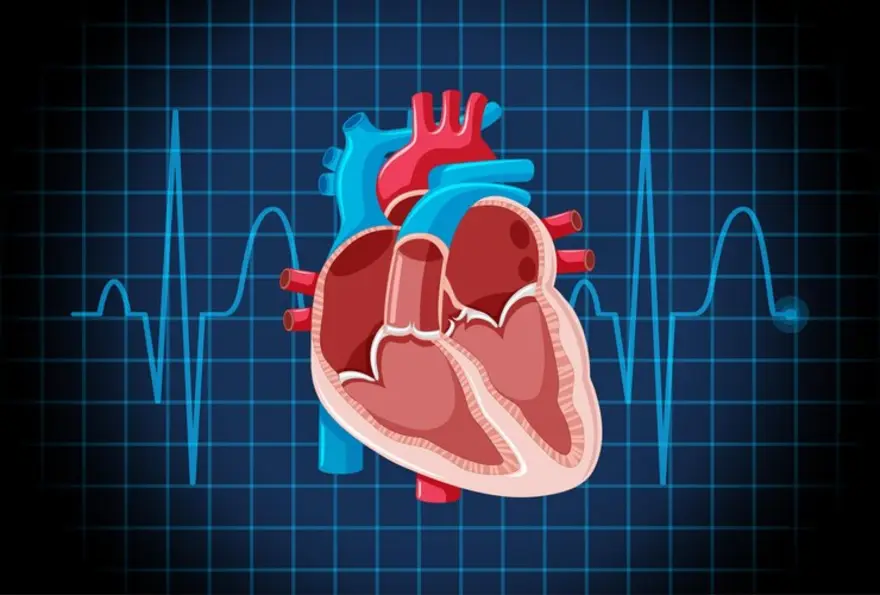Metropolis Blog
Pandemic related stress: 7 Tips to boost your mental health
The second wave of COVID-19 has evoked a sense of fear and devastation in many minds. The pandemic-related lockdowns, health issues of self and loved ones, financial crisis, and inability to meet near and dear ones- all have contributed towards a stressful environment. Fear and uncertainty are dominating our minds. Social distancing never meant emotional distancing The COVID-19 pandemic has had a major impact on our lives. Many of us are facing challenges that can be stressful and overwhelming. There is no denying that social distancing is necessary to reduce the spread of COVID-19, but some people have to go through the feeling of loneliness. Human interaction is important and lack of it has become one of the most important causes of pandemic-related stress. Remember, social distancing means physical distancing and not emotional distancing! Stay connected to your friends and family via virtual modes. Here are 7 Tips to boost your mental health 1. Take breaks from sensational news stories: It is good to be informed, but if we know that those things are putting us under stress, then we can stop it for some time. Keep yourself away from overtly negative news, especially if you have COVID-19 or have been caring for a loved one at home. Do not check upon daily numbers as it can fuel anxiety. Remember every medium counts from the T.V to the newspaper. Be careful about the balance of watching important news and the news that could cause you to feel depressed and disrupt your mental health. 2. Connect with others: While social distancing measures are in place, try to connect with your friends and family through social media, by phone or mail etc. It is said that by opening up about your problems, you are getting an extra hand to solve them and you can be relieved to a great extent. Avoid feeling or making others feel negative, which increases your anxiety. Stay in touch with each other. Share your problems with your family and friends. And keep asking them too. 3. Make routine calls to your friend: It helps to manage your anxiety, and will help to adapt to the present situation. The first thing you have to do in this is to separate your working hours and non-working hours. Do not mix them at all. Try to balance professional and personal lives. 4. Proactively manage your sleep: Good sleep can prevent many health problems. Being sleepless can increase stress levels. Vice versa, when we are under stress, it directly affects our sleep. Now the question is, how do we sleep well? If you want to have a good sleep, then you have to take care of a few things. Protect yourself from blue light like mobiles and tablets, at least 1 hour before bedtime. Maintain a proper routine around your sleep and wake times Read books that relieve you of stress Do not see anything that stresses you before you go to sleep. Exercise every day. 5. Start “something” that makes you happy: Include a few habits in your routine that help you to make yourself happy. Learn singing, dance, paint, play indoor games, read books or write stories- feed your hobbies in your free time. Make time and do not always blame your busy schedule. Try to do something creative in your non-work hours that engages your mind, makes you happy, and helps you to reduce your stress. 6. Exercise as a depression medicine: Clinical studies suggest that regular exercise produces chemicals such as dopamine and serotonin, which are as effective as antidepressants or psychotherapy for treating mild depressions. Most people will not have access to the gym, so it is necessary to create a daily exercise routine at home. Doctors recommend exercising between 30-40 minutes for 5 days a week. So, make a small start with a 10-minute walk, then add a few minutes daily. Practice meditation on a routine basis. 7. Eat food that helps you overcome stress: This means eat everything healthy! A well-nourished body is better at dealing with stress. Increase your intake of whole grains, vegetables i.e., especially green vegetables, seeds, olive oil, cruciferous vegetables such as broccoli, cauliflower, cabbage, kale, and Brussels sprouts. Takeaway Feel free to talk about mental health. Never feel hesitant when talking about mental health, that is utterly wrong. People should be encouraged to talk about their feelings. It is not necessary that you talk to the family. You can also talk to someone who understands you and gives you the right advice. Take help from various support helplines. Do not give up! We are in this together and will come out stronger and tougher!
Creatinine Serum Test: Purpose, Preparation, Normal Range and Results
Creatinine is a waste material that is produced during the normal wear and tear of the muscles of the body. Your muscles have a high-energy molecule, called creatine phosphate. Creatinine is the by-product of creatine phosphate, which is produced at a constant rate and cleared from the blood by the kidneys. Each one of us has creatinine in the blood. If the creatinine clearance is decreased, it results in increased blood (or serum) creatinine. A rise in serum creatinine is an indicator of kidney impairment and creatinine serum test would help you find that out. What is Creatinine Serum Test? The creatinine serum test is a blood test that measures the level of creatinine in your blood. It's part of a group of tests that are used to find out how well your kidneys are functioning (renal function tests). This blood test is usually done when your doctor thinks that your body isn't getting rid of the waste properly. Indications of a Creatinine Serum Test The creatinine serum test is important because it can give doctors various indications, such as: - To measure the level of creatinine in the blood. - To determine how well the kidneys are functioning. - To diagnose kidney disease. - To monitor kidney function during and after treatment for kidney disease. - Check whether your kidneys are facing the side effects of the drugs you take. When do you need a creatinine serum test? Your healthcare specialist might prescribe you this test if you have symptoms of kidney disease, including- Anorexia (an eating disorder characterized by low weight and food restrictions) Frequently painful urination Foamy or bloody urine What is The Normal Level of Creatinine? The normal range of creatinine varies with age, race, gender, and body size. In general, The normal range of creatinine for adult men: 0.74 to 1.35 mg/dL The normal range of creatinine for adult women: 0.59 to 1.04 mg/dL In general, while muscular young or middle-aged adults may have more creatinine in their blood than the general population, elderly people may have lower creatinine. For people who are dealing with malnutrition, severe weight loss, and chronic conditions, creatinine levels might be lower than other people of the same age group, owing to a reduction in muscle mass over time. When Do You Need a Creatinine Serum Test? You may need to get your creatinine levels tested if you have symptoms of kidney disease, are at risk of getting kidney problems, or want to check your kidney health. The following symptoms can be suggestive of health issues related to the kidneys: -Fatigue, not attributed to any other cause -Puffiness around the eyes -Swelling in your feet and/or ankles -Frequent and painful urination -Foamy or bloody urine Your risk of getting kidney disease is higher if you have: -A family history of kidney disease -Type 1 or type 2 diabetes -High blood pressure Is knowing Creatinine Values Tell my Doctor if my Kidneys are Working Properly? Your doctor needs to look at how much creatinine is in your blood along with some other important parameters as well. The reason is creatinine levels in your blood can be affected by your age, race, gender, and body size. The best way to know if your kidneys are functioning well is to look at your glomerular filtration rate (GFR) and creatinine. GFR is a measure of how much blood passes through the tiny filters of the kidneys (glomeruli) each minute. If the kidneys are damaged, they shall pass lesser blood to get filtered. Please note that creatinine is considered a late marker of acute kidney injury because kidney function is decreased by almost 50% before a rise in serum creatinine is observed. What Do Raised Creatinine Levels Indicate? Any health condition that impairs the function of your kidneys is likely to cause a spike in creatinine serum levels. It is equally important to identify whether the condition and process leading to kidney dysfunction are recent or chronic. While recent elevations may be more easily reversed and treated, chronic conditions might be difficult to deal with and demand special care. The most common causes of chronic kidney disease include -High blood pressure -Diabetes. Other causes of elevated blood creatinine levels are: Consumption of a large amount of meat in the diet Certain drugs (for example, cimetidine) Kidney infections, abnormal muscle breakdown (rhabdomyolysis), and urinary tract obstruction. How Do You Prepare for a Creatinine Serum Test? There are a few things you can do to prepare for a creatinine serum test. First, it is important to fast for at least 8 hours before the test. Second, avoid strenuous exercise for 24 hours before the test. Third, avoid taking any medications that could interfere with the test results. Finally, be sure to drink plenty of fluids to keep your body hydrated. How is Creatinine Serum Test Performed? A Creatinine Serum Test is a blood test that measures the levels of creatinine in your blood. If your kidneys are not working properly, the levels of creatinine in your blood will increase. The test is usually ordered when your doctor suspects that you may have kidney disease. It can also be ordered to check how well your kidneys are working after a kidney transplant. Blood test: a small sample of blood will be taken from a vein in your arm. The sample will then be sent to a laboratory for analysis. Urine test: You have to collect your urine sample and submit it to the laboratory for analysis. Result of a Creatinine Serum Test The result of a creatinine serum test is used to determine the following- Serum Creatinine Level The amount of creatinine in your bloodstream and the creatinine filtration rate in your body should be stable, if not constant. Serum creatinine level is the amount of creatinine present in your blood and is measured in milligrams per deciliter (mg/dL). The average serum creatinine level ranges between 0.74 - 1.35 mg/dL (65.4 - 119.3 micromoles/L) in adult men, while it should lie between 0.59 - 1.04 mg/dL (52.2 - 91.9 micromoles/L) in healthy adult women. An increased serum creatinine level is indicative of poor kidney health. Glomerular Filteration Rate (GFR) The creatinine serum test result determines your glomerular filtration rate (GRF). The glomerular filtration rate is the volume of plasma filtered by the glomeruli per second. GFR is used to check whether the kidneys are functioning correctly. Since blood creatinine levels vary from person to person, the GFR can give a more accurate indication of renal function. It is calculated based on several factors, including serum creatinine count, age, gender, etc. A GFR below 60 points toward renal disorders. Creatinine Clearance The removal of creatinine from the bloodstream by the kidneys, which is later excreted as urine, is measured as creatinine clearance. The creatinine measurement in 24-hour urine and blood samples is typically used to calculate creatinine clearance. Therefore, it's essential to collect these samples at the proper time. Creatinine clearance is measured as milliliters of creatinine per minute per body surface area (mL/min/BSA). Men's typical creatinine clearance range from 19 - 75 lies between 77 - 160 mL/min/BSA. Creatinine clearance in women varies from one age group to others follows- 18 - 29 years: 78 - 161 mL/min/BSA 30 - 39 years: 72 - 154 mL/min/BSA 40 - 49 years: 67 - 146 mL/min/BSA 50 - 59 years: 62 - 139 mL/min/BSA 60 - 72 years: 56 - 131 mL/min/BSA Low creatinine clearance indicates poor kidney function and renal disorders. Albumin/Creatinine Ratio The albumin/creatinine ratio is yet another way to evaluate the urine creatinine count. Albumin is a protein in the blood, essential to prevent it from leaking through the veins and arteries. There should be little or no albumin in the urine, as healthy kidneys often do not filter it out of the blood. The albumin/creatinine ratio quantifies a urine sample's albumin to creatinine ratio. It is measured as the ratio of albumin in milligrams (mg) to creatinine in grams (g). The results are typically less than 17 mg/g in healthy adult men, while they should fall below 25 mg/g in healthy adult women. A higher albumin/creatinine ratio indicates diabetic nephropathy, also known as diabetic kidney disease. What Should I Do After Getting My Creatinine Serum Test Results? It is important to tell your doctor about any medicines you are currently taking, both prescription and over-the-counter. Some drugs, like cimetidine, chemotherapy drugs, cephalosporin antibiotics, may increase your creatinine levels and impact your test results. Your doctor may take this into consideration when interpreting your lab test results. Get Geared up for a Better Kidney Health Your kidneys are vital organs that help remove toxic body wastes and optimize your health. Along with getting your serum creatinine and kidney function checked from time to time, keep yourself hydrated and include fresh, leafy vegetables in your diet. Being physically active also helps your kidneys stay healthy and well-functioning. Conclusion The creatinine serum test is a test that is used to detect kidney dysfunction. The kidneys are responsible for filtering blood and ridding the body of waste products, so if they are not working properly, it can lead to a buildup of creatinine in the blood. This test is often ordered as part of a workup for someone who is experiencing kidney failure. This test can also be used to determine the cause of high creatinine levels that are a result of dehydration.
7 Scientific Tips for Aging Gracefully
The population of the world, as a whole, is living longer. It is thus essential to implement proactive steps to create changes at both individual and environmental levels, which can promote aging in a better way. The concept of aging well is a fundamental requirement to improve health and well-being in order to enhance length and quality of life. Aging well highlights the importance of maintaining a healthy lifestyle and keeping wellness on priority while growing older. Here are 7 scientific tips that can help you age gracefully: Keeping physically active It has been observed that poor health in old age is mainly caused due to the effects of multiple lifestyle choices, such as physical inactivity, poor diet, and smoking. Regular exercising lowers the risk of several diseases such as cardiovascular disease, diabetes, etc. Several studies also suggest that aerobic exercises may improve the symptoms of Alzheimer disease. Moreover, certain evidence have demonstrated the beneficial effect of physical activity on aging at cellular levels, causing an increase in energy, flexibility and overall sense of well-being. Various types of physical activity that can be done are: Simple exercises such as walking, jogging, yoga, weight lifting or a dance class possess multiple benefits as they can control weight, uplift mood, and makes you sleep better A 30 minute-walk every day, it can also be broken into shorter strolls It has been recommended that an adult should do 2½ - 5 hours per week of moderate-intensity exercise, 1 ¼ - 2 ½ hours per week of vigorous-intensity aerobic exercises, or a combination of these two. If you haven’t been exercising, discuss with your doctor about how you can get started gradually. Eating a balanced diet Diet is shown to play an active part in how well you age. Nutritious diet helps in keeping an individual mentally sharp and gives energy to enjoy day-to-day activities. Eating a balanced diet not only helps you age well, but also prevent oneself against various diseases such as heart diseases, diabetes, etc. Numerous studies have shown that chronic illnesses, particularly auto-immune diseases such as fibromyalgia and arthritis, can be associated with our diet, hence, a diet rich in anti-inflammatory components such as fresh fruits and vegetables is recommended. In addition, avoiding processed food with a higher glycemic index can raise your BMI, increase your waistline, and raise your blood sugar. Enough vitamin D level is essential as it helps contribute to bone health as you age. Salt should be kept to minimum to prevent high blood pressure. The recommended diet for aging well should include the following: Fruits and vegetables Whole-grain cereals, breads, rice, or pasta Lean protein, such as fish and beans Low-fat or fat-free dairy, such as milk, yogurt or cheese that contain vitamin D Focusing on mental health Mental health is very crucial as happiness with less stress levels can help a person age gracefully and liver longer and healthier. Various tips for improving your mental health includes: One should practice the habit of staying optimistic. Keeping a positive outlook can cure stress associated with life problems. One should stay connected as loneliness is harmful for your mental health. A lonelier individual has higher levels of stress hormones that cause inflammation, linked to disorders like arthritis. Meaningful relationships and a strong social network enhance both mental and physical well-being and longevity. Learn to embrace different aspects of life with a positive attitude. Find new hobbies as exploring new and meaningful things can provide a sense of purpose and keep your anxiety levels to minimum. Keep yourself busy to lessen stress about things you can’t control. Getting enough sleep The sleeping habit of an adult in this era has been greatly affected by changed lifestyle and work pressure. This sleep-deprived state in turn, leads to fatigue and premature aging of body cells. It has been observed that insomnia is more common in older adults. Thus, sticking to a sleeping schedule is important as it can keep a body in sync for appropriate sleep. For an uninterrupted sleep: Keep the room a little cooler and dark Avoid caffeine or alcohol in the evening Avoid electronics before bedtime which emit blue light. Usually sleeping hours are majorly dependent on your age, an 8-hours sleep is recommended for an adult for better mental and physical health. It has been reported that our skin cells build and repair themselves during sleep, and that’s why we feel renewed and rejuvenated. Beneficial effects of appropriate sleep include: Reducing stress and anxiety Lowering the risk of heart disease and stroke Reducing the risk of obesity Improving focus and concentration. Restricting smoking and alcohol consumption Smoking and alcohol, both have shown many negative effects on the process of aging. Cigarettes, chewing tobacco, and other products with nicotine can cause ailments like heart disease, cancer, lung and gum disease, etc. Similarly, limit your alcohol consumption to avoid risk of health diseases including liver ailments. Quitting smoking isn’t easy, but there are resources that can help you quit. Seek the help of a healthcare professional. It has been reported that your body begins to heal within 20 minutes of your last cigarette. Scheduling health tests on time As you age, your body organs also age. The aging body organs are more prone to get diseased and less likely to repair themselves. By getting your health tests done regularly, you are keeping an eye on the aging body. This helps to identify any health condition at an early stage, and take action. Ensure to get a full body check up done twice a year. Maintain hydration Hydration is vital to our bodies as drinking water regularly helps in releasing out toxins and aids in digestion. Additionally, it aids in sleeping better, and improves focus and weight loss. Adequate water intake can also help you avoid dry, flaky skin and fine lines, which in turn, can help your skin look younger.
 Home Visit
Home Visit Upload
Upload

















 WhatsApp
WhatsApp